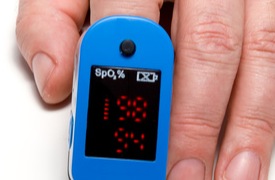
A handheld pulse oximeter is a medical instrument that is used to measure a patient's blood oxygen level. This device is small, portable and utilized to pinpoint heart and respiratory conditions that can cause breathing problems. The blood's oxygen levels usually decreases when a patient develops breathing difficulties.
Arterial blood gases and handled pulse oximeters are the two methods used for measuring blood oxygen levels. Even though many hospitals have large pulse oximeters, the handheld varieties are better suited for most medical settings because they are able to be easily transported. Portable oximeters are not difficult to use and are ideal for patients who need to monitor their own oxygen levels at home.
Depending on the particular manufacturer, handheld pulse oximeters work slightly different. The majority of these devices attach to a screen and come equipped with a finger probe. There are two light beams inside of the oximeter. One light beam is red and the other one is infrared. Both of the beams work together in order to detect the patient's pulse and measure their blood oxygen level.
Getting an accurate reading is important so patients must remove their fingernail polish before using a pulse oximeter. While the finger probe is able to put on any finger, it is recommended to use either the ring finger or index finger. Patients must keep still while using the pulse oximeter because finger movement may give an inaccurate reading.
Other issues that may give an inaccurate reading include an unsecured finger probe and poor circulation. Cold fingers tend to give a weaker pulse that the portable pulse oximeter may not be able to detect. In these cases, a warm towel can be put over the patients hands for several minutes in order to warm the fingers. Afterward, the blood oxygen level test can be retried.
Even though the finger is the best area of the body from which to get a reading, handheld pulse oximeters can also be used on the toe or earlobe. The majority of pulse oximeter devices have a flashing indicator light that runs only while obtaining a reading. Most readings take five seconds to appear on the oximeter's screen.
Add your answer:
Which is better, a finger pulse oximeter or a handheld pulse oximeter?
I would say the Pulse Oximeter is the better than the Handheld Pulse oximeter becasue Pulse Oximeter - Turner Medical specializes in providing our customers with high-quality, low-cost pulse oximeter from the most trusted manufacturers. Also the Pulse oximeter coast you abound $90 while the handheld pulse oximeter will coast you aroung $289
What is the cost for a Nonin Pulse Oximeter?
The price of Nonin Pulse Oximeter vary depending on which one you'll get. They range from normal Pulse Oximeter, to handheld Oximeter. The prices ranges from $69-$500.
How much does a handheld pulse oximeter cost, and what features should I look for when making the purchase?
When looking to buy a handheld pulse oximeter you should expect to pay about 200 dollars. When looking to buy these meters you should make sure it is an active meter.
What are the technical specifications of the Nature Spirit handheld pulse oximeter?
This brand of oximeter will cost you about 200 dollars at least. As for the size specifications that will vary based on model.
Where online can I find an handheld pulse oximeter?
The best place to purchase items like this online is at Amazon.com. This website has many great options available.
What is a pulse oximeter or what does it measure?
An oximeter is a device to measure the oxygen saturation level in blood. I believe that a "pulse" oximeter has a sensor to measure pulse as well, though it wouldn't surprise me if some devices not having such a sensor but otherwise looking and working like a pulse oximeter were casually called that too.
Can you get a pulse oximeter on Overstock.com?
You can purchase a pulse oximeter on Overstock.com. They offer many different options at different price points.
Can you measure a pulse rate with a pulse oximeter?
Most modern oximeters have a built in pulse reader. Your finger is placed in the oximeter, also measuring your pulse along with the % of O2 in your blood.
What does the pulse oximeter tell the physician about the patient?
your oxygen level and pulse rate
Can pulse oximeter measure wrist pulse like vatha pitha kapa?
no
How do you use a pulse oximeter?
To use a pulse oximeter, place the device on your fingertip, toe, or earlobe. It will measure your oxygen saturation level and heart rate by emitting light through your skin. Make sure the area is clean and still to get an accurate reading.
What is the name of the machine used to check your oxygen level?
A pulse oximeter provides non-invasive testing of oxygen saturation levels in the blood.
